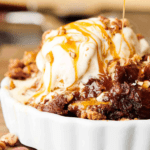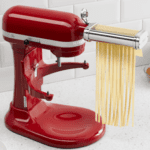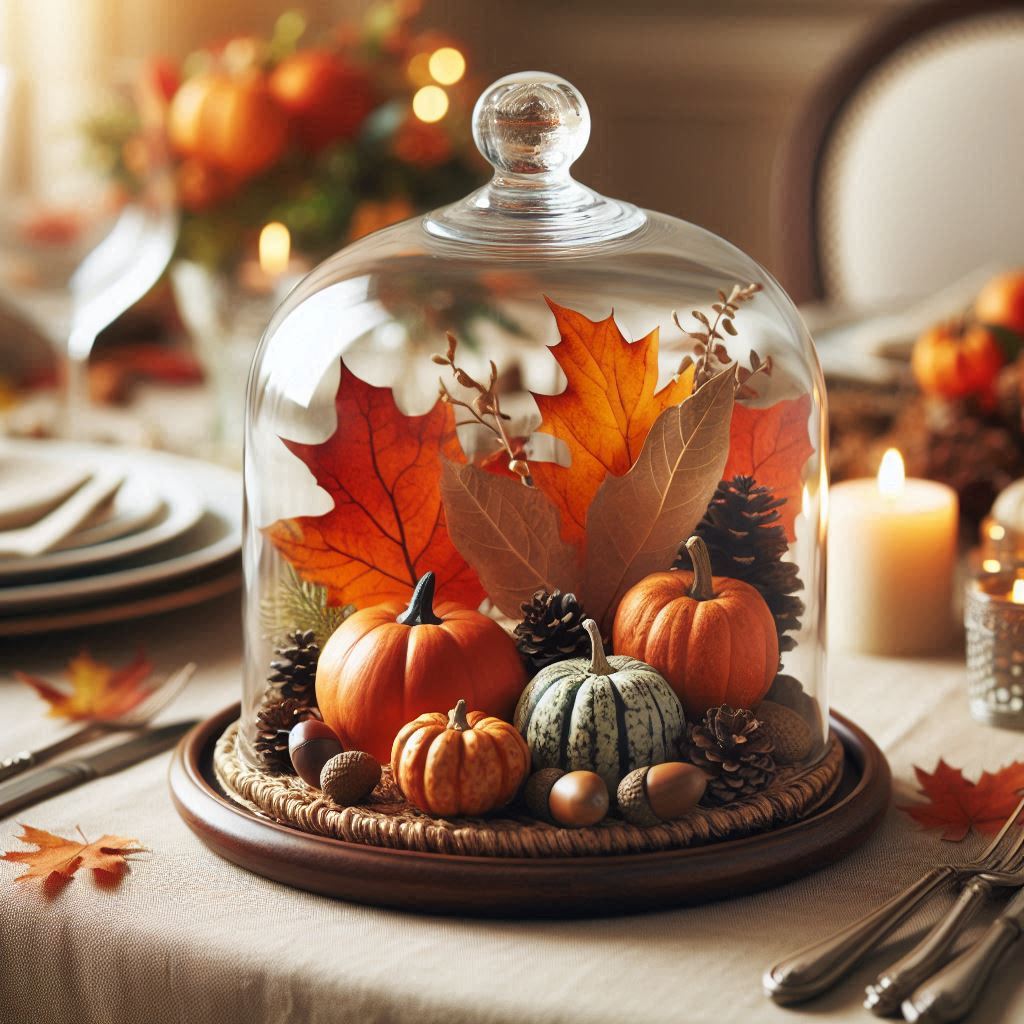Share via:
A pellet grill is a compact, yet powerful cooking appliance that can be used to cook just about anything. A pellet grill infuses food with a smoky flavor by burning wood pellets.
But Have you ever faced the alarming situation of your pellet grill catching on fire?
The sudden burst of flames, the smell of burning wood, and the fear of losing control of your pellet smoker can be truly alarming. While pellet grills are generally considered safe and easy to use, they are not immune to mishaps.


If you’ve ever wondered Why did my pellet grill catch on fire, you’re not alone – pellet grill fires can and do happen on occasion.
There are a few ways that can lead to a pellet grill fire. The two main reasons for pellet grills to catch on fire are either that you have too many pellets in the firepot or too much grease on the drip tray.
It’s very rare for pellet grills to catch fire, but for your safety, it is important to clean your grill after every 2-3 meals and light the fire correctly.
By doing this you can make sure accidents like uncontrolled pellet grill fires won’t happen.
In this grillcuisnes.com guide, we’ll cover:
- Reasons why pellet grill catches fire
- Tips on how to put out pellet smoker fire
- And much more!
Related > > Why Is Smoke Coming Out Of Pellet Hopper? (4 Reasons)
Why Did My Pellet Grill Catch On Fire
Some potential factors that may have contributed to your pellet grill catching fire include Auger issues like blockages or jams in the auger or firebox. Other possible pellet grill fire causes are faulty electrical components, grease or fat buildup, or excessive smoke and heat.
While pellet grills are generally recognized for their safety and reliability, occasional accidents can occur. Similar to any appliance, pellet grills are not devoid of risks. Among the potential hazards, the most concerning is the possibility of a pellet grill fire outbreak.
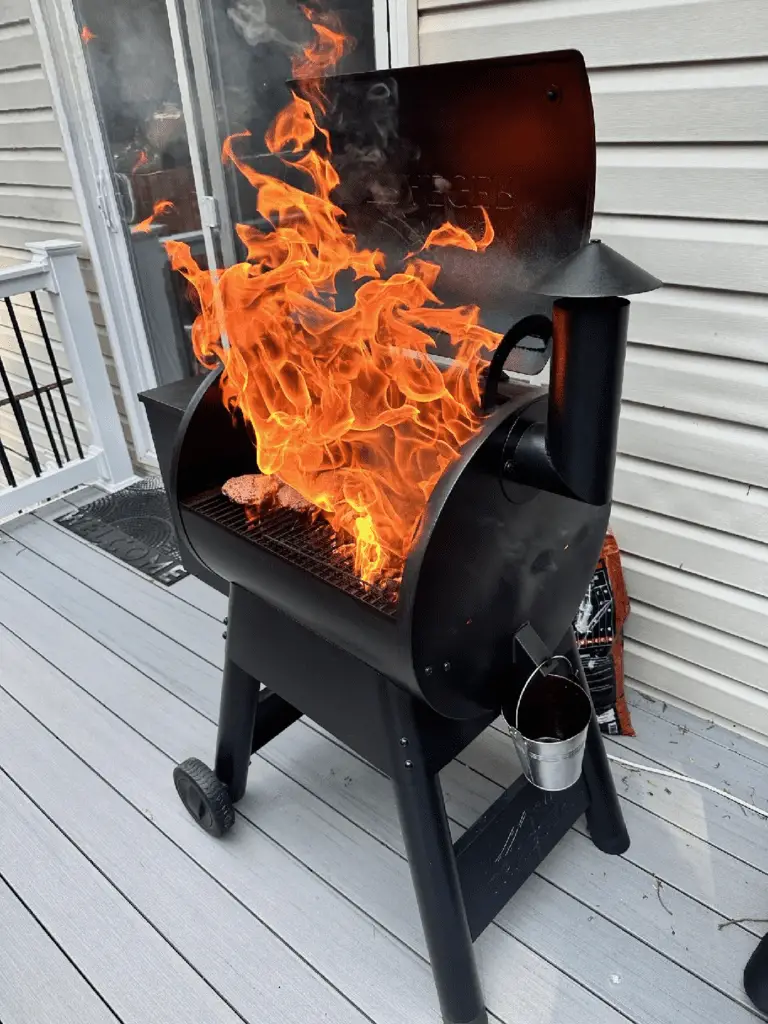

Many people use the Traeger pellet grill and have complained about Traeger catching fire or Traeger grease fire on social forums like Reddit. Before we jump into the common causes of pellet smoker fire let’s discuss how pellet grill grills actually work.
How Pellet Grills Work
The Pellet Feeding and Burning Process
Pellet grills automatically feed wood pellets from a hopper into the firepot chamber. An electric auger rotates to transport pellets into the burn pot chamber where the pellets are ignited using a hot rod or flame broiler. Once lit, the pellets smolder and are partially consumed, producing smoke and heat.
Exhaust fans then draw the smoke over the food cooking area and out the ventilation exhaust. This indirect heating process is how pellet grills are able to slowly infuse food with authentic smoked flavor at controlled temperatures.
Components of a Pellet Grill
The main components include the pellet hopper, auger system, burn pot chamber, cooking grates, exhaust vents, and temperature control module. The digital control panel allows setting the desired cooking temp and monitoring burn pot operation. Internal fans circulate heat throughout the cooking chamber.
Temperature Regulation and Ventilation Systems
A thermostat sensor monitors the grill’s internal temperature and automatically regulates the auger feed speed and exhaust vents to maintain the set point. If the temperature drops, the auger accelerates to increase the burn rate. As it rises, the auger will slow and vents open more to cool things down.
Precise oxygen flow via computer-controlled ventilation is crucial for sustainable burning without spikes or fluctuations that could lead to troubles. Together these systems achieve smooth, hands-free temperature control.
Common Causes of Pellet Grill Fires
The following section will discuss the possible causes of the pellet grill fire.
There are three types of fire that can happen in the pellet grill. It’s crucial to understand it in order to prevent future instances.
1. PELLET GRILL GREASE FIRE CAUSED BY GREASE AND FAT ON DRIP TRAY
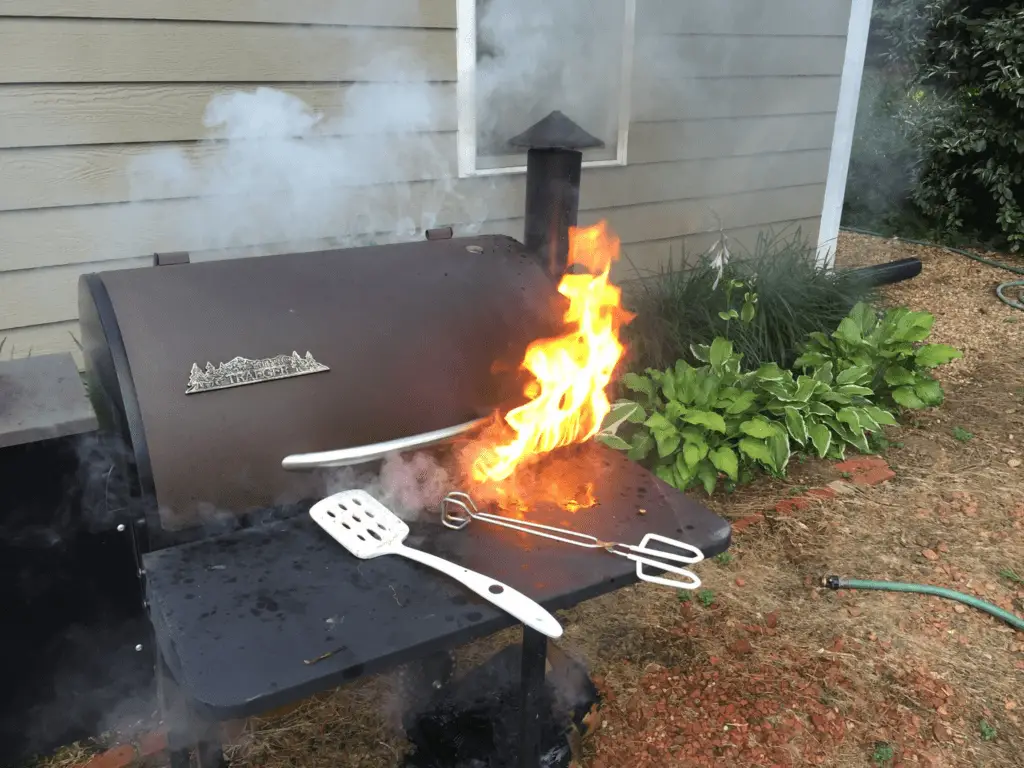

Grease fires are one of the most common types of pellet grill on fire.
When cooking meat with fat and oils, it’s easy for drippings to accumulate below the cooking grates. If they go uncleaned, grease buildup can ignite from a flareup or ember pop. Spilled sauces or marinades on external surfaces or vents also present a fire risk if the grill is at high temperatures.
Grease buildup is a normal and necessary side effect of smoking fatty cuts of meat on a pellet grill. The smoke and juices from the meat will drip onto the drip tray and collect, causing a significant amount of grease to build up.
Grease and fat can always create fire and an inferno on a pellet grill and usually starts on the drip tray and spreads from there. Grease fires are dangerous because they produce large flames and are hard to put out.
If the grease isn’t cleaned out and the grill’s heat gets too high, the grease will liquefy and ignite, which can cause a huge blaze in a matter of minutes.
So it’s necessary to clean and clear out the grease between high-heat grillings.
2. PELLET GRILL FIRE CAUSED BY A LARGE ACCUMULATION OF PELLETS IN A FIREPOT OR BLOCKED AUGER
The auger plays a critical role in providing a consistent flow of pellets to the burn pot. When the auger malfunctions or gets jammed, it disrupts the steady supply of pellets needed for combustion.
In such cases, a backup of pellets can occur, potentially leading to a fire hazard in the hopper. Furthermore, the accumulation of excess grease or ash within the burn pot chamber can also hinder the combustion process.
Several factors contribute to pellet accumulation. If the firepot fails to ignite, pellets may pile up. When this accumulation exceeds safe levels within the firepot, it can result in the pellets igniting, creating an unexpected blaze.
Another cause for concern is the buildup of ashes or other flammable materials in proximity to the pellets, which can act as a catalyst for a pellet grill fire.
It’s crucial to keep pellets dry during pellet grill use to prevent clumping. Moisture in the air can cause pellets to stick together, causing irregular feeding into the auger, which, in turn, increases the risk of a fire.
3- Electrical Component Failures
Electrical component failures within pellet grills, such as issues with the heating element, thermostat, or internal wiring, are a significant concern.
As the pellet grill ages, the heating element or wiring inside your pellet grill starts wearing out, leading to potential short-circuiting. This scenario poses a significant fire hazard as it can ignite nearby grease or other materials within the pellet smoker.
4- Low Pellet Level
An empty or near-empty hopper can cause the burn pot temperature to spike as less fuel is fed. This may chip or crack the pot and small embers could escape. Always keep pellets well-stocked.
5- Flare-Ups
Spilled sauces or marinades on hot grill surfaces or inside the firebox can ignite, especially at higher cook temperatures. Be careful when basting and use heat-resistant materials.
6- Vent Blockage
Clogged vent holes in the grill or exhaust restrict proper airflow. This interferes with the burn process and makes overheating more likely. Clean vents regularly.
Tips On How To Put Out A Pellet Grill Fire
1. Don’t Panic and Keep Calm
When people see large flames engulfing a pellet grill, their first impulse is often to panic.
When we panic, our brain is not able to function as it should and we can make bad decisions that could be dangerous.
If you’re feeling panicked in a group setting, the people with you might feel the same. Stay calm if your smoker on fire, these steps will give you some peace of mind.
2. Unplug The Pellet Grill
If you keep your pellet grill outdoors and it catches fire, you need to make sure that the fire does not spread to the house and other structures. The first thing you should do is disconnect from the power source immediately.
Fires need three things to start: a source of ignition, oxygen, & fuel. If your pellet grill catches on fire then cut off the oxygen and pellet supply by unplugging it as you don’t want the fire to burn for a long time.
3. CLOSE THE PELLET GRILL AND HOPPER LID
The best way to avoid a grease fire is to put the lid on the grill and wait for it to die down.
When the grill catches fire, the lid must be CLOSED TO PREVENT IT FROM SPREADING TO OTHER PARTS OF THE GRILL.
The fire will need oxygen to burn, which is why it’s essential to close the grill and hopper.
Closing the grill or hopper will stop the flow of oxygen. If no oxygen is present, a fire will eventually go out.
4. MOVE THE PELLET GRILL AWAY FROM WALLS AND FLAMMABLE OBJECTS
A pellet grill can easily catch fire if it is too close to a wall or flammable object. Keep an eye on your grill from time to time, and always move it away from walls and objects that could catch fire if a grease flare-up were to occur.
When a pellet grill catches fire, move objects or the grill away from flammable items so it can cool down without posing a danger to other items.
5. DO NOT USE WATER OR FLOUR
It may seem like a good idea to put water on a fire but when it comes to pellet grills there are two key reasons why that’s not the case:-
- – A pellet grill is an electrical appliance and water coming in contact with them may cause permanent damage.
- – Pouring water on a grease fire can sound like a logical first response, but doing so will cause the oil to splatter and spread across the surface of the cooking vessel. The increased oil may cause an even bigger fire to break out. so spraying water on a grease fire will only spread it around and cause more damage.
6. USE A FIRE EXTINGUISHER OR INSULATION BLANKET
Here is a list of The 4 Best Fire Extinguisher For Grill
In the event of a fire, a fire extinguisher is the best bet for putting it out. A fire-resistant blanket or insulation blanket can also be used to put out a fire. This will keep the fire from spreading, and will even make it go out quicker.
Also, check How Do You Quickly Put Out A Grill Fire Without A Fire Extinguisher
5 Tips to Avoid Pellet Grill Fires
Below are the tips that can be used when Traeger catches on fire or in case of Traeger grease fire.
1. Maintain and clean the Pellet Grill
- Keeping the pellets clean can help prevent a pellet grill fire. Clean your grill after each use. The burner, drip pan, and cooking grate of your pellet grill need to be kept clean so that they can work properly without obstruction.
- Cleaning your pellet grill will also reduce the risk of any build-up which could prevent the pellets from reaching the set temperature. This will also help to lessen food sticking on the cooking grate while cooking or causing hot spots while smoking your meat.
- One of the more important rules is not to exceed 20 hours of cook time between cleanings. Grease is a common concern when cooking with bacon because the oils are difficult to clean. Therefore, if you’re cooking with greasier foods – for example, bacon – it may be important to clean more often.
2. Keep an eye out for grease pooling
- Grease should easily slide down the drip tray and into the grease bucket or grease tray. “Grease pooling” refers to grease accumulating instead of flowing down through the grease trough and out of the appliance. Grease pooling is often caused by:
- The drip tray and drip tray liners are not placed properly. Be sure to change the drip liner after 1-3 cooks.
- The drip tray is dirty or damaged. To prevent this, make sure you scrape down your drip tray regularly.
- The grease trough is dirty or damaged.
3. Make sure that your firepot isn’t overflowing with pellets
- Double-check to make sure your firepot isn’t overflowing with pellets or ash before turning the grill back on.
4. Properly start up the Pellet Grill
- Pellet grills are easy to use because they have a specially engineered ignition system that allows the wood pellets to catch on fire and reach the desired cooking temperature.
- For most Traeger pellet grills, the grill needs to be set on the “Smoke” setting at first in order for the pellets to ignite. As soon as they start burning, you can turn them up to a higher heat setting.
- It’s important to follow the ignition sequence when starting or restarting a pellet grill. The most common beginner mistake is when the pellet grill stops mid-smoke and then turns the pellet grill back on without checking the firepot. This will usually cause a pellet grill fire.
You can also read this How Do Wood Pellet Grills Work
5. Store the Pellet in Airtight Storage and Never use the Wet Pellet
- Always store them in a dry place in an airtight container, preferably in a pellet storage bucket. Moisture in the air can cause pellets to clump and feed improperly into the auger, which could lead to a pellet grill fire.
Final Thought: Why Did My Pellet Grill Catch On Fires
Pellet grills are a great way to have a hassle-free kitchen. They can grill a variety of different foods and save plenty of time, energy, and effort. The best part about these grills is how easy they are to maintain.
However regular maintenance and the correct methods for lighting a pellet grill will usually prevent pellet grill fires.
Like any other appliance, pellet grills are safe to use as long as you’re knowledgeable and responsible. If your pellet grill catches on fire, remain calm and refer to this guide.
Related Articles:
Pellet Emergency: Smoker Ran Out Of Pellets While Cooking
Can You Leave A Smoker Unattended?[ 7 Tips]
Smoker Ran Out Of Fuel Overnight
Do Pellet Smokers Cook Faster?
Can You Use A Pellet Smoker In The Winter?
Why did my Traeger catch fire?
There are a few potential reasons why a Traeger pellet grill may catch fire:
Grease fires – Because of excess grease, fat, or drippings from the food Traeger caught on fire if they fall onto hot surfaces or the heat deflector below the cooking area. Grease buildup over time also increases fire risk.
Electrical issues – Faulty wiring or damaged/frayed electrical components could cause sparks that ignite grease or pellets.
Overheating – Issues like a clogged ventilation system can cause components to exceed their safe operating temperatures and potentially start a fire.
Foreign material inside – Accidentally leaving things like paper towels or cleaning rags in the grill can provide fuel for a fire.
Smoldering pellets – If pellets are allowed to smolder for a long time without fully combusting, they can generate enough heat to ignite nearby materials.
User error – Things like leaving the lid open for too long when cooking at high temperatures or placing flammable items too close to hot surfaces increase fire risk.
I am a writer, editor, and publisher of Grillcuisines.com – an online blog dedicated to sharing grilling tips, accessories, and recipes to encourage more people to get outside and grill.
I’m off to find out the different types of grill foods, their seasons, and how to conduct outdoor cooking properly. I’ll also show you some of my grill-worthy cooking tools & accessories!





